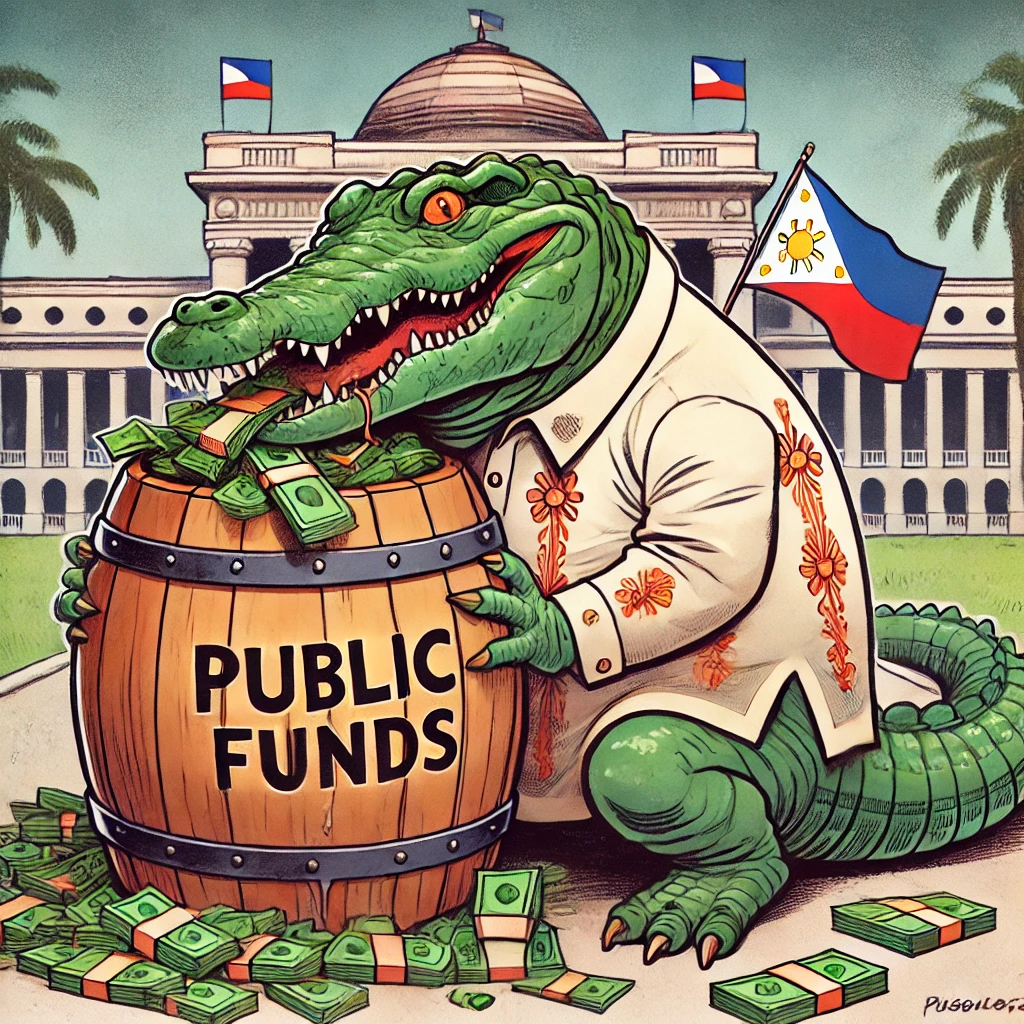Crocodile Barrel: The New Face of Pork Barrel in Philippine Politics
The pork barrel system has long been a point of contention in the Philippines. For years, it symbolized corruption, inefficiency, and political patronage. While officially abolished after massive public outcry, the spirit of pork barrel continues to haunt the nation in more insidious forms. The term "Crocodile Barrel" has emerged as a mocking evolution of the original pork barrel, reflecting how cunningly politicians have adapted to public scrutiny by disguising their self-serving practices. This article delves into the analogy of pigs and crocodiles, their relevance to this corruption scandal, and whether it is fair to these animals to be compared with corrupt officials.
The Evolution from Pork to Crocodile
The term "pork barrel" refers to government funds allocated for local projects, often used by legislators to gain favor with their constituents. These funds were meant to benefit communities, but in practice, they became sources of corruption. Politicians would siphon off large portions for personal gain, leaving substandard projects or none at all.
After the public backlash and a Supreme Court ruling in 2013, it was declared unconstitutional. With greed still in the blood of congress people, pork barrel it reemerged under different names and mechanisms. Projects now appear as part of agency budgets, yet during payouts or inaugurations, the politicians are conveniently present, taking credit, directly or indirectly. Outrageously, every year, during budget hearings, billions of pesos worth of projects are inserted in the last stretch of budget process. Projects and activities of various kinds such as infrastructure, facilities enhancements, scholarships, aids, and other forms of dole-outs are often funded through these concealed allocations. It is alleged that during the implementation of these programs/project, a significant portion of these funds are pocketed in many forms. This practice is colloquially referred to as "Standard Operating Practice" (SOP), a euphemism for institutionalized corruption. They even have the unprogrammed funds to their disposal. In many cases, they sacrifice other programs, many of which are critical projects to fund these insertions. Some of the projects implemented often have no feasibility studies, no plans or no clear guidelines like the AKAP initiative of the lower house.
The new metaphor, "Crocodile Barrel," encapsulates the greed and stealth with which politicians pursue these funds. The crocodile, often symbolizing insatiable hunger and cunning, aptly describes these officials who tirelessly hunt for public funds, disguising their actions as benevolence.
Pork vs. Crocodile: A Comparison
To understand the metaphorical shift from pigs to crocodiles, let's compare the two animals:
| Aspect | Pig (Pork) | Crocodile |
|---|---|---|
| Behavior | Domesticated, generally passive | Wild, aggressive, stealthy predator |
| Appetite | Eats moderately, often used as a source of meat | Voracious appetite, known for devouring prey whole |
| Symbolism in Politics | Symbol of gluttony and excess | Symbol of greed, cunning, and predatory behavior |
| Perception | Generally seen as harmless | Viewed as dangerous and ruthless |
The shift from pork to crocodile suggests a change in how corruption is perceived. While pigs represent gluttony and excess, crocodiles signify something more sinister—predatory behavior and relentless pursuit of gain at the expense of others.
 Is It Fair to Pigs and Crocodiles?
Is It Fair to Pigs and Crocodiles?
While the metaphor is powerful, it is worth questioning whether it is fair to these animals to be compared with corrupt officials.
Pigs: These animals are often associated with dirt and greed, but they are intelligent creatures that provide sustenance for many communities. They do not harm others for personal gain. Comparing them to corrupt officials diminishes their value as animals that contribute positively to human life.
Crocodiles: Crocodiles are apex predators and play an essential role in maintaining ecological balance. They hunt for survival, not out of malice or greed. Unlike politicians who exploit public funds for personal enrichment, crocodiles do not deceive their prey or manipulate others.
In truth, these animals act according to their nature. It is humans—particularly corrupt officials—who choose to exploit systems, betray trust, and harm society. The use of animal metaphors, while rhetorically effective, unfairly tarnishes the image of these creatures.
The Real Mockery: Insulting the People
The real insult lies not in comparing politicians to animals but in how these officials mock the very people they claim to serve. The Crocodile Barrel practice is a direct affront to the democratic principles of accountability and transparency. By disguising their personal gains as public service, politicians perpetuate a cycle of dependency and patronage that undermines genuine development.
During payout events, these officials stand front and center, taking credit for projects funded by taxpayers. They exploit the gratitude of recipients, fostering a culture where people feel indebted to them for what is rightfully theirs. This strategy keeps voters dependent and reinforces the politicians' power, ensuring their reelection.
Breaking the Cycle
To end the cycle of pork and crocodile barrels, citizens must demand greater transparency and accountability. Legislators should not be allowed to meddle in the allocation of public funds beyond their legislative duties. Independent agencies should oversee the implementation of projects to ensure that funds are used appropriately and that officials are held accountable for misuse.
Additionally, public awareness campaigns are crucial to educate citizens about their rights. People must understand that public funds belong to them and that they should not feel beholden to politicians for providing services and infrastructure.
Summary
The transition from "pork barrel" to "crocodile barrel" reflects the evolving tactics of corrupt officials in the Philippines. While the metaphors of pigs and crocodiles effectively highlight greed and cunning, they unfairly malign these animals, which act according to their natural instincts. In contrast, corrupt politicians choose to exploit public resources for personal gain, betraying the trust of the people they are meant to serve.
The true insult is not to pigs or crocodiles but to the Filipino people who continue to suffer under a system that allows corruption to thrive. It is time to break free from this cycle and demand a government that truly serves its citizens with integrity and accountability.
